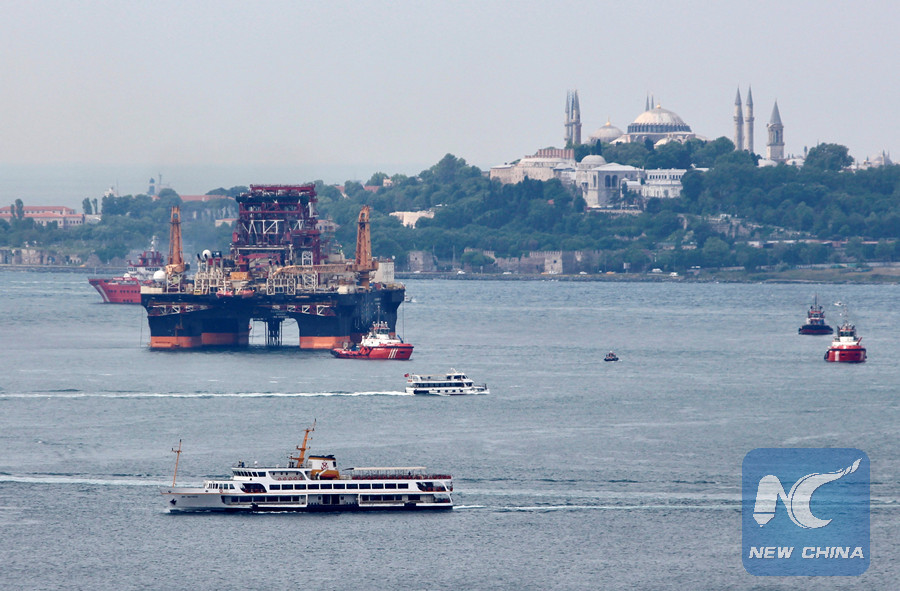
(File photo)Drilling vessel Scarabeo 9, owned by Italian oil service group Saipem, sails in the Bosphorus in Istanbul, Turkey May 21, 2018. (Reuters photo)
ANKARA, Aug. 7 (Xinhua) -- The United States reimposed economic sanctions against Iran on Monday, a move that not only pressures Tehran's nuclear program but also puts Turkey in a tight situation.
On one side, the Turkish government insists on continuing bilateral trade with its neighbors. However, on the other side, Turkey's state-owned Halkbank is expected to face a penalty by the U.S. Department of the Treasury's Office of Foreign Assets Control for its alleged role in the scheme to evade previous Iran sanctions.
The U.S. Treasury Department reinstates sanctions on a number of key Iranian sectors and activities on Aug. 6, including Iran's trade in gold and precious metals, software for integrating industrial processes, automotive sector, rail transactions and civilian aircraft sales.
A visiting U.S. delegation on July 20 informed relevant Turkish companies and banks that they have to wind down their business with Iran in 180 days. The Treasury delegation also met with Turkish authorities and briefed about the sanctions and sought cooperation.
After the meeting, the Turkish Foreign Ministry said authorities were working to avoid the U.S. sanctions from harming Turkey.
However, the Turkish politicians continued defying a unilateral decision taken by Washington and said Turkey is not obliged to implement the U.S. sanctions.
"We do not have to adhere to the sanctions imposed on a country by another country. We don't find the sanctions right either," Turkish Foreign Minister Mevlut Cavusoglu said after the meeting with U.S. officials.
"We held meetings with the U.S. officials in Ankara and told them openly: Turkey gets oil and gas from Azerbaijan, Iran, Russia and Iraq. If I don't buy from Iran now, where am I supposed to meet that need?" the minister said.
In the first four months of 2018, Turkey bought more than three million tons of crude oil from Iran, almost 55 percent of its total crude supplies, according to data from the Turkish energy watchdog.
But, TUPRAS, the largest Turkish oil importer from Iran, has recently reduced its daily purchases by almost 60 percent after U.S. President Donald Trump announced the re-imposition of sanctions against Iran.
In 2017, the trade volume between Turkey and its eastern neighbor Iran was estimated at 10.7 billion U.S. dollars. Turkey has 7.5 billion dollars of imports from Iran, with the majority of them being oil and gas. Turkey has exported mainly gold, steel profiles, fiber board and automotive products worth of 3.2 billion dollars.
Turkey depends heavily on imports to meet its energy needs. Last year, Turkey imported 53 billion cubic meters of natural gas. Russia holds a 52.94 percent share in Turkey's natural gas imports, followed by Iran with 16.62 percent.
"Turkey has to find new oil import source in order to replace Iranian oil," Necdet Pamir, an energy expert from Bilkent University said.
He recalled that in the past when Turkey had to cut back on Iranian oil, Iraqi crude emerged as the alternative. "The government of Iraq will likely be the address again," he said.
Iran provides diversity in energy resources for Turkey, but if Ankara complies with U.S. sanctions, not only its economic ties with Tehran will deteriorate, but also its dependency on Russia will increase, according to Kemal Inat, researcher from Foundation for Political, Economic and Social Research.
But if Ankara objects Washington for slapping sanctions on Tehran, Turkey itself will become subject of U.S. sanctions, Inat said recalling Halkbank case.
A court case in the United States accused Turkey of helping Iran evade U.S. sanctions by providing billions of dollars worth of gold in exchange for Iranian natural gas and oil and Turkey's state-owned Halkbank processed the transaction between 2010 to 2015.
The previous U.S. sanctions on Iran caused tension between two NATO allies, as a former Halkbank senior banker was sentenced in May to 32 months in a U.S. prison for plotting to help Iran evade American sanctions.

